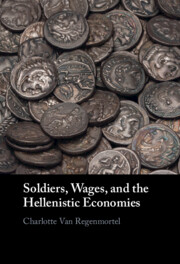Book contents
- Soldiers, Wages, and the Hellenistic Economies
- Soldiers, Wages, and the Hellenistic Economies
- Copyright page
- Dedication
- Contents
- List of Tables
- Acknowledgements
- Note on Transliteration and Translation
- Chronology
- Abbreviations
- List of Maps
- Maps
- Introduction
- Chapter 1 Contextualizing Paid Military Service
- Chapter 2 The Concept of Wage Labour
- Chapter 3 Enlistment and Terms of Service
- Chapter 4 Forms of Remuneration and Standards of Living
- Chapter 5 The Military Labour Market
- Chapter 6 Military Wage Labour and the Hellenistic Economies
- Conclusion
- Epigraphic Dossier
- Bibliography
- Index
Chapter 5 - The Military Labour Market
Published online by Cambridge University Press: 21 May 2024
- Soldiers, Wages, and the Hellenistic Economies
- Soldiers, Wages, and the Hellenistic Economies
- Copyright page
- Dedication
- Contents
- List of Tables
- Acknowledgements
- Note on Transliteration and Translation
- Chronology
- Abbreviations
- List of Maps
- Maps
- Introduction
- Chapter 1 Contextualizing Paid Military Service
- Chapter 2 The Concept of Wage Labour
- Chapter 3 Enlistment and Terms of Service
- Chapter 4 Forms of Remuneration and Standards of Living
- Chapter 5 The Military Labour Market
- Chapter 6 Military Wage Labour and the Hellenistic Economies
- Conclusion
- Epigraphic Dossier
- Bibliography
- Index
Summary
For paid military service to constitute wage labour, soldiers’ labour power ought to be acquired on a labour market. Such a market develops when multiple employers compete over the labour of the same pool of workers and workers can negotiate their terms of service. As argued in this chapter, during the campaign of Alexander soldiers not only leveraged their collective voice to improve their conditions of service but were also promoted up the ranks when their skill set warranted it. These phenomena laid the foundations for the development of a market for labour during the Wars of the Successors, when multiple employers had to vie for the service of the same group of soldiers. Increasingly motivated by monetary gains and not restricted by political allegiance, these soldiers enlisted with the highest bidder, thereby driving the price of military labour upwards.
- Type
- Chapter
- Information
- Soldiers, Wages, and the Hellenistic Economies , pp. 143 - 166Publisher: Cambridge University PressPrint publication year: 2024

